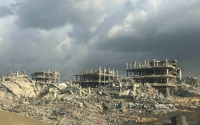Common Dreams / Published on Wednesday, August 23, 2006 by the Associated PressLauren Frayer
An oil slick caused by Israeli bombing has begun sinking to the floor of the Mediterranean, blanketing marine life with sludge, according to a Greenpeace video that shows dead fish along the sea bottom.
The scuba diver's videotape, released Tuesday by Greenpeace, also shows the sunken slick sliding ominously toward a lone red sea urchin rooted in the sand, its tentacles waving in the current. The footage graphically details some of the environmental destruction a month after the oil spill began sinking, creating what has been called Lebanon's worst-ever environmental disaster.
The U.N. has said the spill could take as long as a year to clean up and cost $64 million.
"You have the bottom of the sea filled with fuel _ between the rocks and little valleys. It's just dotted and covered with black tar," said Mohammed El Sarji, head of the Lebanese Union of Professional Divers.
Sarji recorded the footage, which showed oil spread four inches thick over a 100-yard-wide area of the sea bed near Beirut.
Some 110,000 barrels began pouring into the Mediterranean after Israeli warplanes on July 14 hit a coastal power plant at Jiyeh, 12 miles south of Beirut. More missiles hit a day later. Six fuel tanks ruptured in all, sparking explosions that knocked out a dike meant to prevent spills.
Israeli military officials said Tuesday that the fuel tanks were attacked as part of a broader campaign against infrastructure used by the guerrillas to transport weapons. The attacks were meant to disrupt Hezbollah's fuel supplies, said the officials, who spoke on condition of anonymity under military regulations.
At first, the oil slathered 85 miles of Lebanon's coastline _ reaching into Syria _ and blocked sunlight from penetrating the water's surface, killing small plants on which many fish feed. Now that it is sinking, the oil threatens plants and fish that live on the sea floor.
"Some of it became denser than sea water and sank to the bottom. It's like a big thick blanket that smothers living organisms," said Rick Steiner, a professor at the University of Alaska and oil spill expert who worked on the 1989 Exxon Valdez disaster.
"That was three times larger this, but it was crude oil, and this is fuel oil that was going to run generators (at the power plant). This stuff is heavier and thicker _ and much harder to work with. It gets stuck to rocks and it's difficult to wash off," he said. "But the good thing about it being so thick is that we might be able to get it off the sea bed with rakes or shovels."
U.N. officials on Tuesday expressed worry at the slow pace of the cleanup, hampered by Israeli bombardment and blockades for a month while oil continued to seep out into the Mediterranean.
"There have been hostilities in the area, and the environmental side of Lebanon's problems unfortunately couldn't be addressed until now," said Nick Nuttall, spokesman for the U.N. Environment Program.
On Monday, Israel granted the U.N. permission to fly over Lebanon's coast to do an aerial survey of the spill, and flights were expected to begin within days, Nuttall said.
Finland on Tuesday said it would send nearly $800,000 to help with the operation and urged other EU countries to join in. Cleaning equipment has already arrived from Norway, and more was on the way from France, Nuttall said.
Removing the thick sludge from the sea floor would require remote-controlled underwater vehicles, or dredging devices towed behind a floating vessel motoring up and down the coast, said Steiner, who was contracted by the Lebanese government to help.
With an Israeli naval blockade still in place, that large of an operation on Lebanon's coast _ with divers and boats to move against the spill _ would be possible only with Israeli permission.
Nuttall said he was optimistic such access would be granted. "We have assurances from the Israeli authorities," he said.
The U.N. overflights would gauge the amount of oil still floating on top of the water, and estimate damage to Lebanon's shoreline. But Steiner said the amount of oil that has submerged was still unknown _ and dangerous.
"If we don't get this stuff out of the water, a month or six months from now, this it will probably pop back to the surface ... . We could see huge tar balls washing up on shores of the Mediterranean for years to come," he said.
The spill appeared to be staying along the Lebanese and Syrian coasts. Mediterranean currents had pushed the oil northward toward Syria, closing beaches there, Steiner said. To the south, Israel's environment ministry said Tuesday, no traces had been spotted on Israeli shores. North of Syria, Turkish authorities also said the slick had not reached their shores.
With 20 years experience cleaning up oil spills, Steiner said the dense fuel sludge posed a special challenge.
"Every single oil spill is unique, but this one was caused by an act of war ... . But I'm not even sure that even if we'd had all the equipment in the world and access, we would have been able to contain this," he said. "Once the oil hits the water, it's too late."






